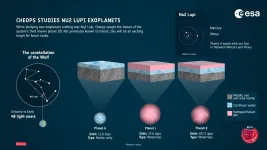(Press-News.org) India and Pakistan have fought four wars in the past few decades, but when India faced an oxygen shortage in its hospitals during its recent COVID-19 surge, Pakistan offered to help.
On Twitter, hashtags like #IndiaNeedsOxygen and #PakistanStandsWithIndia trended. Finding these positive tweets, however, was not as easy as simply browsing the supportive hashtags or looking at the most popular posts. Negative tweets often hijack the supportive hashtags for trolling or fighting with other users. And Twitter's algorithm isn't tuned to surface the most positive tweets during a crisis.
Ashique KhudaBukhsh of Carnegie Mellon University's Language Technologies Institute led a team of researchers who used machine learning to identify supportive tweets from Pakistan during India's COVID crisis. In the throes of a public health crisis, words of hope can be welcome medicine.
"When a country is experiencing a national health crisis, the more supportive messages you see, the better," KhudaBukhsh said. "If you're just randomly searching, you'll find positive tweets about 44% of the time. Our method gives a person positive tweets 83% of the time. That person will have to do a lot less work to find the supportive tweets."
By combining existing language classifiers -- algorithms trained by machine learning that determine, for example, whether speech is positive or negative, hopeful or distressing -- the team developed a system that identified supportive or positive Pakistani tweets about India 83% of the time, far better than existing methods. The team used their method to conclude that more than 85% of the tweets posted about the COVID crisis in India from Pakistan were supportive.
"We have boundaries but not in our hearts," one tweet detected by the team began.
The team included KhudaBukhsh, Clay H. Yoo and Rupak Sarkar from the LTI and Shriphani Palakodety, an engineer the blockchain and AI company Onai who earned his master's from the LTI. They published their results in a paper titled, "Empathy and Hope: Resource Transfer To Model Inter-country Social Media Dynamics," which was accepted into the ACL Association for Computational Linguists Workshop on Natural Language Processing for Positive Impact. The work was performed in real-time with the crisis and as members of the team worried about the health of loved ones in India.
The research is significant on several fronts. First, the team showed that existing language classifiers could be useful in broad contexts. This is important because to deploy a classifier that will be useful in the middle of the crisis, it must be built quickly. It cannot be built from scratch, and the team wanted to see if existing research into language classifiers could help.
To detect supportive tweets during India's COVID crisis, the team used a hope-speech classifier that KhudaBukhsh and Palakodety built with the late Jaime Carbonell, a distinguished professor in the School of Computer Science who founded the LTI, to identify positive YouTube comments on videos posted about the 2019 escalation of conflict between India and Pakistan over Kashmir. The team then combined the hope-speech classifier with a known empathy-distress classifier.
Despite these two language classifiers being built for different reasons and trained on different data, they effectively detected positive tweets during India's COVID surge.
"We showed that there is some sort of universality in how we express emotions," KhudaBukhsh said. "And we showed that we can use existing solutions, combine them and attack future crises quickly.
The research was also potentially significant to the crisis in India. KhudaBukhsh and Carbonell envisioned the hope-speech classifier as an alternative way to combat hate speech. Instead of detecting and deleting, downplaying or blocking hate speech -- which exists in droves on the internet -- the pair sought to use their hope-speech classifier to identify and amplify supportive messages. People are influenced by what they see and read, and if hopeful messages are put in front of them rather than hateful ones, it could affect how they think and act.
The team identified tweets that offered prayers to India, spoke to the common humanity of two countries, and sent love.
"Heartbreaking to see this situation in our neighbourhood. Send love and prayers from Pakistan. May Almighty Allah help humanity through this pandemic. Stay strong. Stay safe," a tweet found by the team read.
Emphasizing the support between India and Pakistan could make a difference, KhudaBukhsh said. And since so many fights now happen over the internet, maybe that's the place to start.
"These two countries have such an acrimonious past," KhudaBukhsh said. "Any positive behavior from either side can help promote world peace."
INFORMATION:
San Francisco, CA, June 28, 2021 - A new study by Pendulum Therapeutics was presented at the American Diabetes Association's (ADA) 81st (Virtual) Scientific Sessions, the preeminent global conference for diabetes clinicians, researchers, and professionals where cutting-edge science and advances in diabetes research, prevention, and care are discussed. The findings shine a light on proprietary probiotic formulations that may be used to help patients with Type 2 Diabetes (T2D).
The research report entitled, "Changes in Circulating Metabolites, Including Butyrate, Points to Underlying Mechanism of a Probiotic Intervention That Improves Postprandial Hyperglycemia in Type 2 Diabetes," is believed to be the first of its kind. Its findings show Pendulum ...
(Philadelphia, PA) - Like a blocked water line, obstructions in blood vessels in the human circulatory system can cause serious problems. This is especially the case in superior vena cava syndrome (SVCS), in which oxygen-depleted blood returning from the head, upper chest, and arms is partially or completely prevented from reaching the heart. The result, however, is far more serious than the inconvenience of low water pressure from a clogged pipe - SVCS requires immediate attention.
Each year, some 15,000 people in the United States are affected by SVCS, symptoms of which include facial swelling, ...
A new paper published by an East Carolina University researcher in the Department of Coastal Studies shines light on the effect human-made infrastructure and natural topography has on coastal wetlands after major storm events.
In partnership with NASA and Florida International University, the study, led by assistant professor David Lagomasino, was published in the July edition of Nature Communications.
The study focused on the effects of Hurricane Irma, which struck Florida in 2017, and the damage it caused to the state's mangrove forests. The research team found that the forests suffered unparalleled dieback after the major hurricane.
Mangrove forests are often damaged after hurricanes, but Lagomasino said forests in Florida have shown great resiliency in ...
LMU biologists have shown that 'supervisor' and 'motivator' proteins are required to enable a third factor to perform its function in photosynthesis.
Plants, algae and cyanobacteria need only three ingredients for the synthesis of sugars via the process of photosynthesis - carbon dioxide, water and sunlight. However, the operation is far more complicated than this simple list of ingredients might suggest. Prof. Dr. Dario Leister and research group in the Department of Biology I at LMU are analyzing the complex regulation of photosynthesis. Their latest findings shed light on the roles of three proteins, named PGRL1, PGRL2 and PGR5, which participate in the control of one of the two subsystems of the photosynthetic apparatus. PGRL2 itself was first discovered in the course of the ...
COLUMBUS, Ohio - The most narcissistic U.S. presidents since 1897 preferred to instigate conflicts with other great power countries without seeking support from allies, a new study suggests.
Results showed that of the presidents measured, those highest in narcissism - including Lyndon B. Johnson, Teddy Roosevelt and Richard Nixon - were about six times more likely to initiate a dispute with another great power in any given year than a president with average levels of narcissism.
The inclination to "go it alone" in international disputes fits with the desire ...
Public opinion surveys could be used more widely to understand regional variation in vaccine hesitancy, experts have recommended.
The research shows vaccine uptake rates for childhood vaccines are significantly lower in regions where hesitancy observed in mass public opinion surveys is more pronounced.
This data is often not widely available, which makes it challenging for experts to analyse the links between attitudes and real-world behaviour. The study says this data should be used by public health officials to understand where vaccines are more likely to be rejected, and who should be the target of information campaigns.
The research published in the journal ...
While exploring two exoplanets in a bright nearby star system, ESA's exoplanet-hunting Cheops satellite has unexpectedly spotted the system's third known planet crossing the face of the star. This transit reveals exciting details about a rare planet "with no known equivalent", say the researchers.
The discovery is one of the first results from ESA's Cheops (CHaracterising ExOPlanet Satellite), and the first time an exoplanet with a period of over 100 days has been spotted transiting a star that is bright enough to be visible to the naked eye.
Named Nu2 Lupi, this bright, ...
PITTSBURGH, June 28, 2021 - It was a nagging mystery: A rare-disease expert at UPMC Children's Hospital of Pittsburgh had found a successful treatment for two of the deadliest symptoms of one of the more common classes of rare diseases diagnosed by newborn screenings, but one symptom--painful episodes of muscle breakdown that land victims in intensive care--persisted.
Today, the scientists announce in the journal Clinical & Translational Immunology that they've gotten to the bottom of the self-destructive syndrome and have a good lead on a treatment.
"These episodes looked a lot like inflammatory ...
An incredibly rare hybrid warbler with mismatched color patterns has allowed researchers to disentangle the genetic drivers of two traits that usually come as a package deal--the black face mask and the black throat patch in blue-winged and golden-winged warblers. A new study describing the peculiar bird and pinpointing the location in the genome that controls the face mask and throat patch appears online in the journal Ecology.
"Golden-winged warblers have both a black face mask and a black throat patch, while blue-winged warblers have neither," said Marcella Baiz, postdoctoral researcher at Penn State and first ...
Some exoplanet searches could be missing nearly half of the Earth-sized planets around other stars. New findings from a team using the international Gemini Observatory and the WIYN 3.5-meter Telescope at Kitt Peak National Observatory suggest that Earth-sized worlds could be lurking undiscovered in binary star systems, hidden in the glare of their parent stars. As roughly half of all stars are in binary systems, this means that astronomers could be missing many Earth-sized worlds.
Earth-sized planets may be much more common than previously realized. Astronomers working at NASA Ames Research Center have used the twin telescopes of the international Gemini Observatory, a Program of NSF's NOIRLab, to determine that many planet-hosting ...



